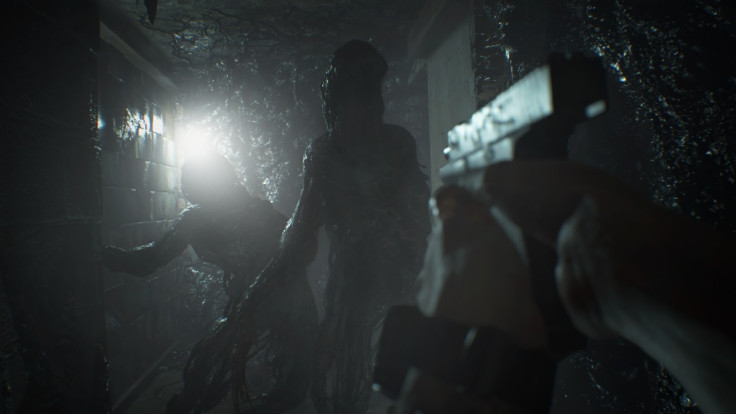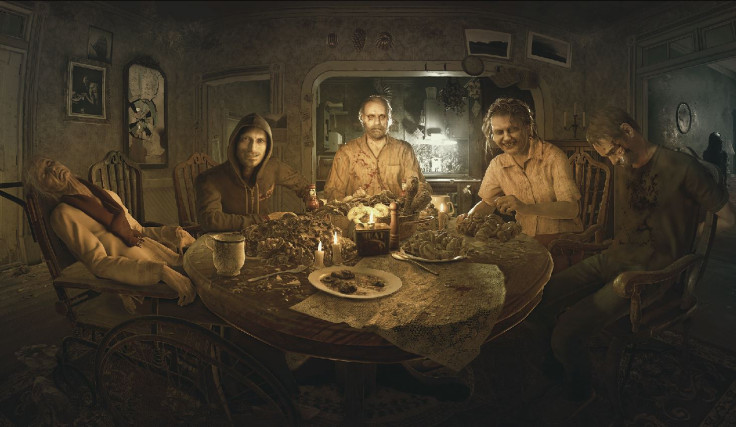How Resident Evil 7 is molded by the hateful, terrified world of Trump and Brexit
Capcom's survival horror perfectly reflects the state of the world in 2017.

As Maddy Myers observed in a fantastic essay for Paste Magazine, the original Resident Evil game played capriciously with the nineties zeitgeist. If you were alive – and had a newspaper delivered to your door each morning – in 1996, it's likely you were afraid of science, and infection.
As the Human Genome Project neared completion, it threatened to dispose of our comforting superstitions about what constituted self: mad cow disease would kill anyone who dared enjoy a burger, and with Dolly the sheep, man had beaten God at His own game. For what impossible thing would we reach next?
Later Resident Evil games also attempted to riff on contemporary fears. The villains' plot in Resident Evil 4, to infect the American president's daughter with their mind-controlling parasite, and use her to overtake the White House from within, had echoes of conspiracy theories popular in the US after 9/11.
In Resident Evil 6, rogue states, private military firms and terrorist cells seek to use bio-weapons to destroy the world; the 2012 attacks against diplomatic missions in Benghazi and the Mayan's prophesied apocalypse lent credence to that game's otherwise spectacular horror.
As of 2017, our collective fears have drawn inwards. Rather than shady corporations operating who knows where, or despotic foreign powers, our minds are occupied by the increasingly rapid dismantling of familiar political ways. Systems we previously regarded as stable – law, union, healthcare – are being transformed and destroyed on an almost daily basis. Institutions that once seemed sacred, and untouchable by a mere government, are being undone.
Hence the Baker family in Resident Evil 7. If what we fear now is an unravelling of customs, a dissolution of social accord, it seems appropriate that the villains of RE7 are a mutated American family – the pictures on their walls show them previously happy, tranquil, together. But as of the summer of 2017, when the game is set, they are pale and grotesque versions of their former selves, a broken institution literally taking pieces out of one another.
When Jack, patriarch of the Baker family, appears to us in an hallucination as his previous, well self, he is repentant: "I ain't a murderer, son." Something made him, his wife, his son, the way they are. Like the black mould crawling over the floors and ceilings of the Baker house – the slow erosion of people's beliefs in change and social welfare – in RE7, as in 2017, there is something maddening in the air.
The threat in Resident Evil 7 is not so much death as assimilation: the bodies in the basement are covered with the same advancing black ooze as the walls; a document found early in the game lists how many people have been caught and successfully "turned". When Jack apprehends us, he shouts "Welcome to the family, son," as if signalling our imminent symbiosis with the black mould and the destroyed Baker domicile.
And yet it is not the Bakers, per se, who are responsible for the conversions, but the ooze itself. Put another way, the people are not to blame. The Bakers are not bad, alien individuals. They've simply been convinced, as it were, by something external.

In the real world, the ooze is neither Left nor Right. It's the feeling of disappointment, defeat and being so ignored by systems that the only thing left to do is vote to pull them down. For the Bakers, the black mould got in and destroyed their family. For us, it wrenched apart political – but still dearly held – establishments. But it is not dehumanising.
Spoilers for the opening of Resident Evil 7 follow
Appropriately, the first infected person we meet is Mia – the protagonist's missing wife. Though the black mould has her at that moment, she is still in there, and our character, Ethan, still loves her. Likewise, political forces – leaders, administrations, even something so abstract as a general social mood – come and go.
Considering the news out of Washington, DC and Downing Street currently, one struggles to encourage compassion either to the people in office or the electorate which put them there. But at the very least, it is still true that a ballot cast by the latter does not represent the sum total of their character. In the literal sense of physically attacking him, Mia is against Ethan, but she is still herself, and to assume otherwise, to assume she is entirely the mould – as that hallucination of a more kindly Jack demonstrates – would be unwise.
Thus, perhaps even more so than the original, Resident Evil 7 feels like a game for our time. Intangible forces have ripped apart a long-standing establishment, both in the form of the Baker family's 19th-century wooden house and the family itself. The same forces threaten to spread and encapsulate further. But to broadly dehumanise people already taken, to consider them monstrous, distant and not at all people, is to do the disfiguring work of the mould for it.
At a time such as this, when empathy, union and any sense of social responsibility are imperiled, the parallels in RE7, wherein people fight against an encroaching blackness, are plain to see.
For all the latest video game news follow us on Twitter @IBTGamesUK
© Copyright IBTimes 2024. All rights reserved.






